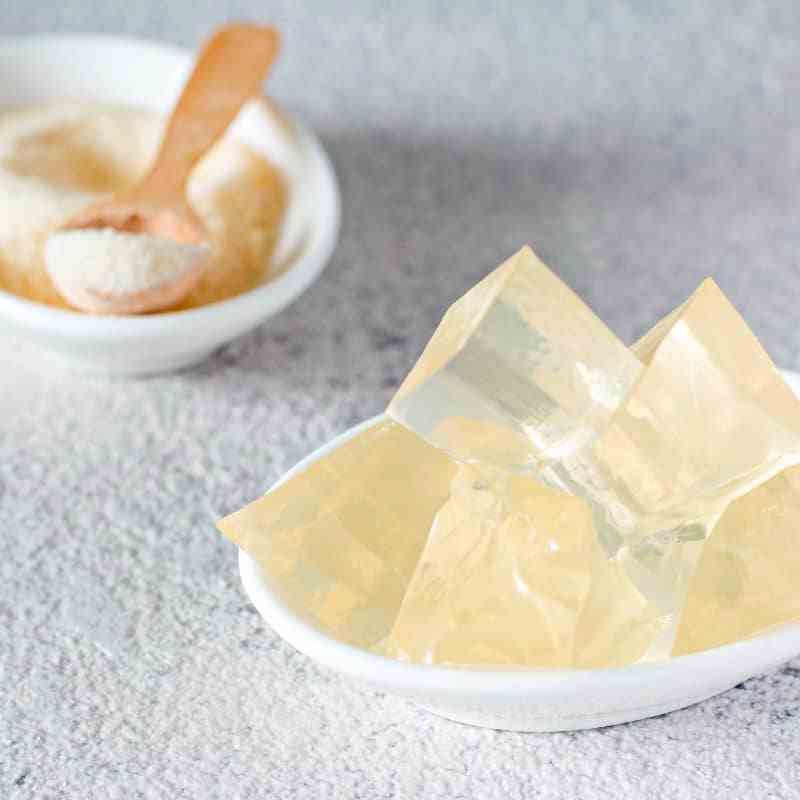In the world of nutrition, gelatin often flies under the radar. Despite its widespread use in everything from desserts to pharmaceuticals, many of us are unaware of what exactly gelatin is, let alone its nutritional content and health implications. This article aims to shed light on this overlooked ingredient. We’ll delve into what gelatin is, its nutritional profile, and the potential health benefits and risks associated with its consumption. We’ll also explore ‘Is It Safe to Eat Gelatin Everyday?’
What is Gelatin?

Gelatin is a translucent, colorless, and flavorless food ingredient that is commonly derived from collagen taken from animal body parts. It is brittle when dry and becomes rubbery when moist.
Gelatin is a collection of peptides and proteins produced by partial hydrolysis of collagen extracted from the skin, bones, and connective tissues of animals such as domesticated cattle, chicken, pigs, and fish. During hydrolysis, some of the bonds between and within component proteins are broken.
It is commonly used as a gelling agent in food, beverages, medications, drug or vitamin capsules, photographic films, papers, and cosmetics. Substances containing gelatin or functioning similarly are called gelatinous substances.
Gelatin is nearly tasteless and odorless with a colorless or slightly yellow appearance. It is transparent and brittle, and it can come as sheets, flakes, or as powder. Polar solvents like hot water, glycerol, and acetic acid can dissolve gelatin, but it is insoluble in organic solvents like alcohol. Gelatin absorbs 5–10 times its weight in water to form a gel.
SHOP FOR THE UNFLAVORED GELATIN POWDER ON AMAZON
The gel formed by gelatin can be melted by reheating, and it has an increasing viscosity under stress (thixotropic). The upper melting point of gelatin is below human body temperature, a factor that is important for mouthfeel of foods produced with gelatin.
Nutritional Content of Gelatin
Gelatin is a protein-rich food with a unique amino acid profile. Here’s a breakdown of the nutritional content of gelatin:
- Calories: A tablespoon (7 grams) serving of gelatin contains about 10 calories.
- Protein: Gelatin is high in protein, providing about 6 grams per tablespoon.
- Fat: Gelatin contains no fat.
- Carbohydrates: Gelatin has a low carbohydrate content, with about 2 grams per tablespoon.
- Fiber: Gelatin does not contain any fiber.
- Sugar: Gelatin contains about 2 grams of sugar per tablespoon.
It’s important to note that while gelatin itself is low in carbohydrates, it’s often used in foods that are high in sugar and other carbohydrates. Therefore, the nutritional content can vary depending on how it’s used. Also, because gelatin is derived from animal collagen, it is not suitable for those following a vegan or vegetarian diet.
Health Benefits of Consuming Gelatin
Gelatin, a protein derived from collagen, has been associated with several potential health benefits due to its unique combination of amino acids. Here are some of the key health benefits of consuming gelatin:
- Hydrated Skin: The protein and amino acids in gelatin can help the body build more collagen, a vital element in healthy skin. As people age, their natural collagen levels drop, which can lead to skin losing elasticity and the development of wrinkles. Consuming collagen can improve the skin’s hydration and reduce wrinkles.
- Healthy Intestines: The proteins in gelatin can help support the intestinal wall, including building the protective mucus lining in your intestines. Gelatin also contains glutamic acid, another amino acid that can help protect the intestinal wall from damage and prevent a leaky gut.
- Lower Blood Sugar: The amino acid glycine, found in gelatin, may help manage blood sugar levels in those with Type 2 diabetes. In addition to a drop in blood sugar levels, study participants who took glycine as a treatment experienced reduced inflammation.
- Stronger Joints and Bones: Gelatin can strengthen connective tissues and increase the density of the cartilage, which can reduce joint pain. It also contains lysine, which helps strengthen the bones. Gelatin can improve the body’s ability to absorb calcium, which can help prevent bone loss. Due to these effects, gelatin may be used as a supplement to reduce the risk of osteoporosis.
- Hair and Nail Health: Gelatin is often touted for its potential benefits for hair and nail health. The high protein content and specific amino acids can help strengthen hair and nails, promoting growth and health.
- Weight Management: Gelatin is also known to promote feelings of fullness, which can help in weight management.
Remember, while gelatin has many potential benefits, it’s important to consume it as part of a balanced diet and not rely on it as a sole source of nutrition.
Potential Risks and Side Effects of Consuming Gelatin
While gelatin is generally considered safe for most people when consumed in food amounts, it can cause side effects in some individuals or when consumed in large amounts. Here are some potential risks and side effects of consuming gelatin:
- Digestive Issues: Consuming gelatin can cause digestive issues such as an upset stomach, bloating, and burping.
- Allergic Reactions: Some people may have allergic reactions to gelatin.
- Animal Disease Contamination: There is some concern about the safety of gelatin because it comes from animal sources. This has led to some concern about contamination from sick animals.
- High Protein Intake: Consuming a lot of gelatin, which is high in protein, over a long period of time can potentially lead to several health problems, including bone disorders, kidney problems, increased risk of cancer, liver disorders, and heart disease.
- Mouth Sores and Other Oral Issues: High doses of gelatin might increase the risk for side effects, including sore throat, swollen gums, and mouth sores.
It’s important to note that while gelatin is commonly consumed in foods and is considered safe by the FDA, the safety of taking high doses of gelatin supplements is not well known. If you take any medicines regularly, talk to your doctor before you start using gelatin supplements. In general, you should tell your doctor about any supplements you’re taking, even if they’re natural.
Healthy Ways to Incorporate Gelatin into Your Diet
Gelatin can be a healthy addition to your diet for its protein content and potential benefits like improved joint health and gut function. However, incorporating it in healthy ways is important to avoid excess sugar or unhealthy fats. Here are some ideas:
Savory Options:
- Bone Broth: This is a natural source of gelatin and packed with other nutrients. Enjoy it plain, use it as a soup base, or add it to stews and sauces for extra richness.
- Savory Puddings: Make savory puddings with vegetables, herbs, and spices for a protein-rich snack or side dish. Try flavors like tomato basil, roasted garlic, or curried cauliflower.
- Thicken Sauces and Soups: Add a teaspoon of gelatin powder to thicken soups, sauces, gravies, or stews for a boost of protein and body without heavy cream.
- Panna Cotta: This savory version uses vegetable broth and herbs for a protein-packed appetizer or light meal.
- Meat Aspics: While traditionally known for being gelatin-heavy, opt for lean meats and vegetables for a healthier take on this classic.
Sweet Options (Mindful of sugar):
- Homemade Gummies: Use fruit juice, purees, and natural sweeteners to make healthy and fun gummies using gelatin powder. Control the sugar and enjoy delicious treats.
- Chia Pudding: Add a scoop of gelatin powder to your chia pudding recipe for extra protein and a firmer texture. Use natural sweeteners like fruit or honey.
- Yogurt Parfaits: Sprinkle some unflavored gelatin powder on top of your yogurt parfait for added protein and a textural twist. Add fruit and nuts for a complete snack.
- Protein Mousses: Make healthy mousses with fruits, Greek yogurt, and gelatin powder for a protein-rich and satisfying dessert. Use natural sweeteners sparingly.
- Baked Goods: Add a small amount of gelatin powder to baked goods like muffins, cookies, or pancakes for added protein and moisture. Be mindful of added sugars in the recipe.
General Tips:
- Check Labels: Opt for unflavored and unsweetened gelatin powders or sheets. Be wary of pre-made options with high sugar or artificial ingredients.
- Start Small: Begin by adding small amounts of gelatin to your diet and gradually increase as tolerated. Listen to your body for any digestive discomfort.
- Consider Plant-Based Options: Agar agar is a plant-based gelling agent with similar properties to gelatin.
Remember, moderation is key! While gelatin can be a healthy addition, balance it with other protein sources, fruits, vegetables, and whole grains for a well-rounded diet.
Dietary Recommendations for Gelatin Consumption
When it comes to consuming gelatin, it’s important to consider the following dietary recommendations:
- Daily Intake: The National Institutes of Health suggests that taking up to 10 grams a day for up to six months is safe. However, individual needs may vary depending on factors such as age, sex, and overall health.
- Source of Gelatin: Gelatin can be found in various foods, including soups, broths, candies, and desserts. However, some of these foods can contain high levels of sugar or fat, so they should be eaten in moderation.
- Protein Intake: Gelatin is a high-protein product. The Dietary Guidelines for Americans 2020–2025 recommend that adults consume 46–56 g of protein each day, depending on their age and sex. As gelatin is rich in protein, it can contribute to meeting these daily protein requirements.
- Balanced Diet: While gelatin has many potential health benefits, it’s important to consume it as part of a balanced diet. This means eating a variety of foods to ensure you get a wide range of nutrients.
SHOP FOR THE GELATIN SUPPLEMENT ON AMAZON
Remember, it’s always a good idea to consult with a healthcare provider or a registered dietitian before making significant changes to your diet or starting any new dietary supplement regimen.
Gelatin Alternatives
If you’re looking for alternatives to gelatin, there are several options available, especially if you’re following a vegetarian or vegan diet. Here are some of the most common gelatin substitutes:
- Agar-Agar: Derived from Red Sea algae, agar-agar is a popular vegan substitute for gelatin. It’s odorless, tasteless, and colorless, much like gelatin. However, it sets more firmly than gelatin and performs better under high temperatures.
- Carrageenan: Derived from seaweed, carrageenan is another plant-based alternative to gelatin. It’s widely used in the commercial food industry as a vegan thickener or gelling agent.
- Pectin: Pectin is a natural carbohydrate found in fruits and can work as a gelatin replacement. It’s often associated with jam-making.
- Cornstarch: Cornstarch is a versatile thickening agent that works well in recipes calling for gelatin. It’s a simple swap that can yield equally satisfying results in your dishes.
- Arrowroot Powder: This fine white powder is derived from tropical plants and possesses thickening abilities that can rival gelatin. It’s perfect for clear soups and glazes.
- Guar Gum and Xanthan Gum: These are plant-derived products that are often used as thickening and stabilizing agents. They can be used in a variety of recipes as a substitute for gelatin.
- Tapioca Starch: Derived from the cassava root, tapioca starch is another alternative to gelatin. It’s often used as a thickening agent in cooking.
- Instant Clear Gel: This is a modified cornstarch that works well as a thickener and can be used as a gelatin substitute.
Remember, the best substitute will depend on the specific recipe and the texture you’re trying to achieve.
Gelatin in Commercial Products
Gelatin is widely used in a variety of commercial products due to its unique properties as a gelling agent. Here are some of the key areas where gelatin is used:
- Food Industry: Gelatin is present in many food products like gummy candies, yogurt, ice cream, and desserts. It’s used as a gelling agent that allows flavors to disperse quickly. It’s also used in soups and broths, and as a stabilizer in dairy products.
- Pharmaceutical Industry: Gelatin is used in the production of hard capsules and soft gels. It has lower production costs, fewer manufacturing complexities, and secures excellent active pharmaceutical ingredient (API) dissolution rates. It also helps protect sensitive ingredients from oxygen, light, microbial growth, and other forms of contamination.
- Cosmetics Industry: Gelatin is used in various cosmetic products due to its ability to bind and thicken products. It’s also used in hair and skin products due to its protein content.
- Photographic Industry: Gelatin is used in photographic films and papers. It acts as a binder for light-sensitive silver halides.
- Industrial Uses: Beyond food, pharmaceuticals, and cosmetics, gelatin has a wide array of uses in industrial and consumer markets.
Remember, while gelatin is a versatile ingredient, it’s derived from animal sources, which may not be suitable for those following vegetarian or vegan diets. Alternatives like agar-agar, carrageenan, and pectin are often used in these cases.
FAQs
Q 1. What is the difference between gelatin and collagen?
Ans. Collagen is a protein found in the connective tissues of animals. When collagen is processed, it becomes gelatin. In other words, gelatin is the cooked form of collagen.
Q 2. Can I use gelatin as a protein supplement for muscle building?
Ans. Yes, gelatin is a good source of protein and can be used as a supplement for muscle building. However, it should not be the sole source of protein in your diet.
Q 3. Is there a difference between the gelatin used in food and the gelatin used in pharmaceuticals?
Ans. The gelatin used in food and pharmaceuticals is essentially the same, but the purity and processing standards may differ. Pharmaceutical-grade gelatin is usually subject to stricter quality control.
Q 4. Are there any ethical concerns related to the production of gelatin?
Ans. Yes, since gelatin is derived from animal sources, there are ethical considerations. These include concerns about animal welfare, the environmental impact of livestock farming, and the use of genetically modified organisms (GMOs) in feed.
Q 5. How can I tell if a product contains gelatin?
Ans. Gelatin is usually listed on the ingredient label of a product. However, it may also be hidden under terms like “hydrolyzed protein” or “E441”.
Q 6. Does gelatin have any benefits for post-workout recovery?
Ans. Gelatin is rich in protein and amino acids, which are essential for muscle recovery. Some research suggests that consuming a combination of gelatin and vitamin C before exercise can help improve collagen synthesis and promote joint health.
Q 7. How does the body digest and absorb gelatin?
Ans. Gelatin is a protein that is broken down into amino acids by the digestive system. These amino acids are then absorbed into the bloodstream and used by the body to build new proteins.
Q 8. Can I make my own gelatin at home?
Ans. Yes, you can make your own gelatin at home by boiling animal bones, skin, and connective tissue. This process is time-consuming and requires careful preparation to ensure a clean and safe product.
Conclusion
In conclusion, gelatin, a protein derived from collagen, is a versatile ingredient used in a variety of foods and commercial products. Its unique combination of amino acids offers several potential health benefits, including improved skin and hair health, joint and bone strength, and gut health.
However, like any food substance, it should be consumed in moderation as part of a balanced diet. While gelatin is generally safe for most people, it can cause side effects in some individuals and may not be suitable for those following vegan or vegetarian diets. Fortunately, there are several plant-based alternatives available for those who cannot or choose not to consume traditional gelatin.

Good day, and welcome to Fitthour. My name is Shubham Vijay, and I am a certified personal trainer and nutrition coach with 6 years of experience in the fitness industry. At Fitthour, we specialize in types of training, such as strength training, cardio, or HIIT, and our mission is to help clients achieve their fitness goals and improve their overall health.




